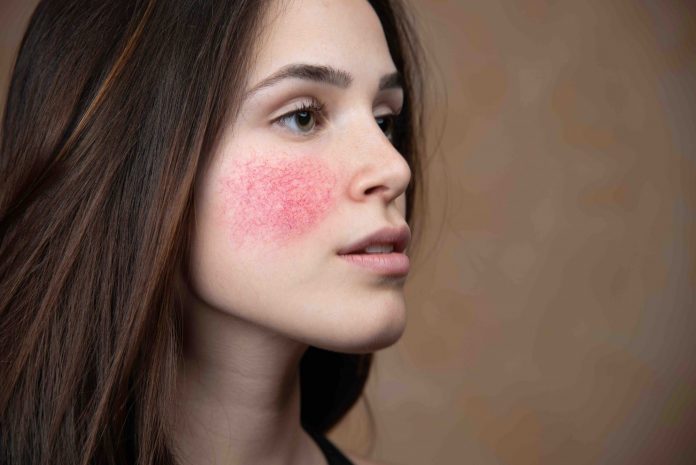Rosacea is a common long-term inflammatory skin condition that can affect anyone but is mainly seen in middle-aged and older adults, women, and those with fair skin.4
The symptoms of rosacea can come and go, resulting in flare-ups.1
Flare-ups can be caused by triggers such as excess sun, stress, foods, allergies, medications, etc.6
There has also been some suggestion that genetics may play a role.1,3
No cure for rosacea exists but there are many symptomatic treatments available, including lifestyle factors to prevent flare-ups.
Symptoms
Rosacea presents as reddened skin across the nose and cheeks and may also affect the eyes. The condition may initially display as a facial blush or flush of the nose and cheeks, which can go away, then may progress to longer-lasting redness with the appearance of a rash and small blood vessels beneath the skin.1
If this is left untreated, the skin can thicken, leading to firm red bumps (generally on the nose) and may also lead to eye damage or vision loss if eye symptoms are left untreated.4
The main symptoms of rosacea include:
- Facial redness, which can begin as a flush or blush.
- Rough scaly skin.
- Rash.
- Visible blood vessels.
- Skin thickening (generally on the nose and mainly affects men).
- Eye irritation.
- Patients can complain about burning, hot, stinging, itchy skin.
Treatment options
Treatment depends on the type of diagnosed rosacea. It can include topical or oral treatment together with lifestyle modifications. The topical therapies that may be prescribed are metronidazole, brimonidine, ivermectin and azelaic acid, whereas oral treatment can consist of doxycycline, minocycline, erythromycin, or isotretinoin.5
Lifestyle modification
- Avoid triggers, which may include hot drinks, spicy food, dairy products, sun or wind, red wine, cosmetics, exercise, and hot baths or showers.2
- Wear sunscreen (broad spectrum, SPF30-plus).
- Avoid abrasive and fragranced face washes and moisturisers.
- Avoid sun exposure and heat.
- Limit alcohol use.
General measures
Patients must be advised of general measures for the treatment of rosacea before they try a medicated treatment.
If treatment is sought for cosmetic reasons (reducing the appearance of redness and inflammation), azelaic acid is available over the counter.3
Ensure referral to a doctor or dermatologist for first-time presentations and severe or refractory forms.
What can pharmacists recommend for patients with rosacea?
- Azelaic acid. This has been shown in a study to be effective in about 18 per cent of people for reducing inflammation associated with rosacea.8 It’s also effective at preventing pores from becoming blocked. In this study, azelaic acid was used on the affected areas twice daily, morning and evening.8
- A non-abrasive, fragrance-free facial cleanser and moisturiser.
- Minimising sun exposure and using a low-irritant broad-spectrum sunscreen (SPF30 or higher).2
- Avoiding topical corticosteroids, which can cause a rebound flare-up.5
- Green tinted moisturiser, to help mask redness (if patient desires).
- Referral to an eye specialist If the eyes are affected.
Differential diagnosis
- Acne – can be experienced simultaneously.
- Seborrheic dermatitis – similar presentation with redness but often presents with scaling around the eyebrows, nose and scalp.
- Keratosis pilaris – can be experienced simultaneously. Genetics related. Fixed blush appearance with fine keratotic plugs, which can also affect the upper arms, upper thighs, buttocks and cheeks.7
- Periorofacial dermatitis – inflammatory papules around the mouth, eyes and nose. Generally caused through prolonged use of potent topical corticosteroids on the face.
References:
- rosacea.org/patients/all-about-rosacea
- ncbi.nlm.nih.gov/pmc/articles/PMC6281021/
- racgp.org.au/afp/2017/may/rosacea
- niams.nih.gov/health-topics/rosacea
- tgldcdp.tg.org.au/viewTopic?etgAccess=true&guidelinePage=Dermatology&topicfile=c_DMG_Rosacea_topic_1&guidelinename=auto§ionId=c_DMG_Rosacea_topic_1#c_DMG_Rosacea_topic_1
- betterhealth.vic.gov.au/health/conditionsandtreatments/rosacea#complications-of-rosacea
- healthline.com/health/skin/keratin-plugs#appearance
- ncbi.nlm.nih.gov/books/NBK279475/
This feature was written by Rebecca Miltiadou and was originally published in the November issue of Retail Pharmacy magazine.






